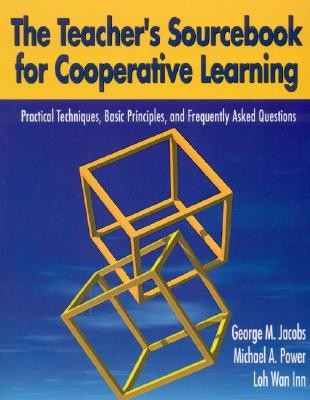| The Teacher′s Sourcebook for Cooperative Learning: Practical Techniques, Basic Principles, and Frequently Asked Questions Contributor(s): Jacobs, George M. (Author), Power, Michael P. (Author), Loh, WAN Inn (Author) |
|
 |
ISBN: 076194608X ISBN-13: 9780761946083 Publisher: Corwin Publishers OUR PRICE: $84.50 Product Type: Hardcover Published: August 2002 Annotation: " ""The" "Teacher??'s Sourcebook for Cooperative Learning" has ideas and activities that can be used by all teachers who want to improve their classroom management and promote community building." "Rebecca Den Hartog, Elementary Classroom Teacher Mercer Island School District Mercer Island, WA " "I unreservedly recommend this important resource to any preservice or inservice teachers of young children." "Chris Iddings, Assistant Professor of Language and Literacy Vanderbilt University Nashville, TN " "The authors reveal considerable wealth of experience as teachers and as users of CL. This will be a very successful book." "Jon A. Scaife, Lecturer in Education School of Education, University of Sheffield Sheffield, England Can today??'s students excel individually by working in tandem with their peers? Yes! says this dynamic team of authors who have combined their first-hand experience and in-depth research to create this essential guidebook. In "The Teacher??'s Sourcebook for Cooperative Learning," the authors demonstrate how any classroom teacher can use CL techniques for lesson planning and classroom management. Learn how to: Incorporate the basic principles of CL into everyday learning experiences Improve students??? collaborative skills, positive interdependence, and individual accountability Prepare for, manage, and create tasks for CL lessons Handle special situations, avoid trouble spots, and collaborate with other teachers, administrators, and parents This exciting book represents best practice based on hands-on experience and in-depth research. Incorporate these principles into your lesson plan and see how you can achieve one of every educator??'s most rewardingcontributions . . . helping students to help themselves, and each other.
|
| Additional Information |
| BISAC Categories: - Education | Administration - General - Business & Economics | Education - Education | Teaching Methods & Materials - General |
| Dewey: 371.3 |
| LCCN: 2002000152 |
| Physical Information: 0.7" H x 8.7" W x 11.26" (1.67 lbs) 184 pages |
| Descriptions, Reviews, Etc. |
| Publisher Description: A dynamic team of authors demonstrates how any classroom teacher can use cooperative learning techniques for lesson planning, classroom management, and improving students′ collaboration skills. |
Contributor Bio(s): Jacobs, George M.: - George M. Jacobs has a PhD in Educational Psychology from the University of Hawaii and a master's degree in Linguistics from the University of Illinois--Chicago. He has been teaching courses on cooperative learning since 1988. He has published many articles on the topic and is also a coauthor of Learning Cooperative Learning via Cooperative Learning: A Sourcebook of Lesson Plans for Teacher Education (1997). He is a member of the Executive Board of the International Association for the Study of Cooperation in Education and editor of its newsletter. He also specializes in second-language learning and helped compile an annotated bibliogra-phy of works on group activities in second-language instruction. Contact him at gmjacobs@ pacific.net.sg.Power, Michael P.: - Michael A. Power has a PhD in Educational Psychology and a master's degree in English as a Second Language from the University of Hawaii. He is the Director of Instruction and Assessment for the Mercer Island, Washington, school district. He has taught English as a second language in the United States, Japan, and the Republic of Korea, and has, for many years, conducted training throughout the Pacific in instructional strategies for teachers (including cooperative learning).Loh, Wan Inn: - Loh Wan Inn has an EdD in Science Education from the State University of New Jersey and master's degrees in Education (First Honors) and in Arts from Trinity College, University of Dublin. She is a chartered biolo-gist (Institute of Biology, UK). She has lived and worked in the United States, Singapore, Ireland, and Australia. She has taught courses on science, mathematics, science education, environmental education, coop-erative learning, curriculum design, and multiple intelligences. Through her interest in cooperative learning, she has seen it introduced in science by preschool and secondary school teachers as part of their science educa-tion modules. She also designs and trains teachers for camps on multiple intelligences and science. Her previous books include storybooks for young children and books on science and science education. She is also a member of a number of environmental organizations. |